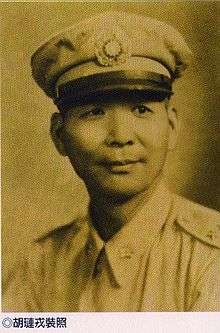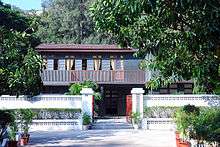Hu Lien
Hu Lien (traditional Chinese: 胡璉; simplified Chinese: 胡琏; pinyin: Hú Liǎn; 1907–1977) was a Chinese Nationalist general who participated in the Northern Expedition, anti-communist Encirclement Campaigns, Second Sino-Japanese War and Chinese Civil War.
Hu Lien 胡璉 | |
|---|---|
 Hu Lien | |
| Nickname(s) | The old man |
| Born | October 1, 1907 Hua County, Shaanxi |
| Died | June 22, 1977 (aged 69) Taipei, Taiwan |
| Allegiance | |
| Years of service | 1926–1977 |
| Rank | |
| Unit | 11th division |
| Commands held | 11th Division (reorg.), March 1942 18th Corps, 1944 Deputy Commander 12th Army, 1948 Kinmen Defense Command |
| Battles/wars | Second Sino-Japanese War
|
| Awards | Order of Blue Sky and White Sun in 1944 |
Whampoa Military Academy
He graduated alongside Lin Biao, one of the best Communist commanders. Many future commanders also graduated from the academy, including Du Yuming, Fan Hanjie and Sun Yuanliang.
Second Sino-Japanese War
Hu was a regiment commander in the 11th division in the Battle of Shanghai. He was wounded several times (including a shot through the jaw) and was promoted to division commander after the battle was over. As part of their Sichuan invasion plan, the Imperial Japanese Army attacked Western Hubei, hoping to destroy Chiang Kai Shek's last remaining power base. Under Hu's leadership, the newly formed 18th Corps repulsed the Japanese attack. Afterward, he was awarded with the Order of Blue Sky and White Sun, the highest military decoration in the Republic of China.
Huaihai Campaign
As a result of Hu's impressive track record, his unit was deployed around central and eastern China as a firefighting brigade. He was so successful in fighting against the communist forces, even communist commanders like Liu Bocheng and Su Yu suffered defeats from this spectacular Nationalist advance. Before the Huaihai Campaign of 1948, his father died and he had dental problems, and was absent from the front. When the 12th army was surrounded by the communist troops in Anhui province, Hu was flown in a small airplane in the battle field personally led a rescue mission and breakout from the encirclement with the remnant of his troops. After seven days of daring escape, he reached Nanjing and Chiang Kai Shek tasked him with reorganizing the 12th army.
South Vietnam
Hu played a major role in Republic of China–Vietnam relations, serving as the ambassador to South Vietnam in Saigon from 1964 to 1972 and surviving attempts on his life by the communists, such as the 1967 Saigon Chinese embassy bombing. His appointment to the Republic of Vietnam was part of the KMT policy of sharing its expertise in anti-communist affairs with other countries in the region. [1]
Taiwan

He had twice been appointed as commander of Kinmen Defense Command. He was credited to repulse an invasion of Kinmen by the communist force in 1950 and participated in several commando attacks to mainland. Chiang Kai-shek had deep faith in his military leadership and gave a sword with inlaid jewels to Hu. He was promoted to four-star general in 1975 after fifty years of army service. Hu died in 1977 of heart failure and was buried in Kinmen, where he had soundly defeated the Communist invasions in 1949 and 1958.
References
- Chen, Jie (2002), Foreign policy of the New Taiwan: pragmatic diplomacy in Southeast Asia, Edward Elgar, pp. 60-61, ISBN 978-1-84064-635-1
| Wikimedia Commons has media related to Hu Lien. |
| Government offices | ||
|---|---|---|
| Preceded by New position |
Commander of
1st Kinmen Defense Command |
Succeeded by Liu Yuzhang |
| Preceded by Fang Chi |
KMT Chairman of Fukien Province and Secretary General and Governor of Fukien Province November 1949–? |
Succeeded by Tai Chung-yu |